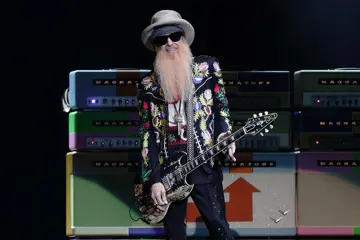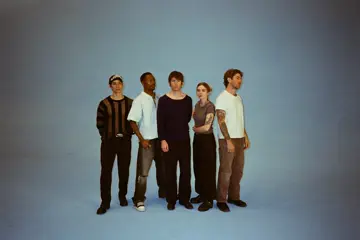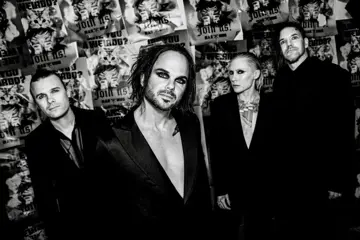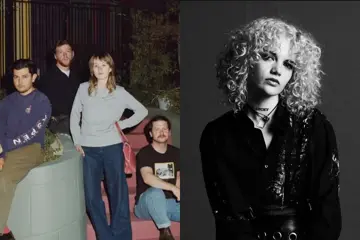“I thought it was a beautiful script,” said Donald Sutherland to Total Film recently. “[I thought] it had the possibility to be the most influential film made in this country for many years.”
Sutherland was talking about the upcoming film adaptation of wildly successful young adult novel, The Hunger Games, a dystopian thriller that places its young heroine Katniss Everdeen (Jennifer Lawrence) in a sort of Survivor-meets-The Running Man deathmatch with 23 other underprivileged adolescent combatants for the entertainment of a populace that watches the entire thing on TV. Sutherland plays the sinister patriarch President Snow, the man whose role it is to keep the one per cent entertained and the 99 per cent oppressed.
It's a part Sutherland apparently chased off his own bat, and now he's sitting opposite Front Row in a swanky LA hotel – the sort of place where there's an iPad in every room, just because – fielding questions from a battalion of journalists from around the world. Front Row elbows its way between a veteran long-winded Italian and a studious film nerd from France to ask: why? What was it about The Hunger Games that impressed Sutherland so? I mean, shit, we're talking about Hollywood royalty here, an actor whose career spans half a century, a man who's got his star on the Walk of Fame, who worked with Fellini and Bertolucci, who played the lead roles in films like Don't Look Now and Klute.
“I was not aware of the novel [at first],” he admits. “But I was so impressed with Gary Ross' script. Gosh. It was really terrific. I thought it could maybe be a catalyst for young people in this society, and to be a part of that – to be a part of something that was part of their movement – thrilled me.”
Don't miss a beat with our FREE daily newsletter
There's something puckish about Sutherland, an apparently undiminished enthusiasm for his craft and for life in general, a boyish gleam in his eye as he holds court, relating stories about Fellini, his son Kiefer and an acquaintance who got arrested at the airport after telling immigration officials that he was in the USA “to shoot a pilot”. But he speaks with a certain gravitas too, as if he's used to being listened to. And he takes his time to think carefully about his answer when Front Row asks him what exactly he thought the film might catalyse.
“Well,” he says, “apparently a lot of young people like these books. Maybe they will come to realise out of liking them that [the story] is an allegory – that certain aspects of the society that we live in are as unjust as perhaps the Occupy Wall Street people think. I didn't care if I was walking on [in the film]. I would have walked on.”
In the event, director Gary Ross wrote extra scenes to provide greater insight into Snow's character – a wise move, considering that the President could so easily have been a fairly one-dimensional villain (a suggestion, it has to be said, that doesn't amuse Sutherland: “I don't think,” he says sternly, “that any of my characters could ever be one-dimensional”).
For his part, Ross was similarly struck by the novel's powerful vein of allegory when he first read it – it's a rare young adult novel that evokes the spirit of Guy Debord, after all. “I read The Hunger Games in one sitting,” Ross says. “I was completely riveted by it. I thought it talked about the way that entertainment can be used as a political instrument, and the way entertainment devolves into spectacle, and the way that spectacle can be used as a means of political control. And I think it's the way that [the government] gets the people to participate in the games [that] is particularly brilliant. They're not just oppressing them, they're getting them to participate [in their own oppression]. I thought that the story had a lot on its mind that's relevant to where we are today.”
It's Sutherland who delivers perhaps the film's key line when he observes that the Hunger Games exist to give the populace hope, with hope being a far more effective method of repression than fear. This, as it turns out, was one of the two extra scenes that Ross wrote: “We had a long conversation about the nature of the kind of political structure [in the books],” Sutherland recalls. “[Gary] wrote those two other scenes, with Snow explaining why of the 24, one survives. Why hope is essential. Why people will continue if you give them hope. But hope is a spark, and it will grow into a flame if you don't control it.”
The spark grows into a flame in the form of protagonist Everdeen, played with consummate skill by Jennifer Lawrence. Both Ross and Sutherland are full of praise for the film's young star. Ross says, “There's a beautiful human element [to the film], and that's what Jen was able to add. Hers is a rare talent. I auditioned a lot of people, but when she came in, it was like, 'Forget about it.' Hers was the best audition I've ever seen.”
Her performance also gives an anchor to what's a fairly horrific concept: kids slaughtering other kids for the entertainment of the general public. One of The Hunger Games' more notable achievements is managing to convey the abhorrence of its premise while keeping a suitable rating. “The trick to that,” Ross says, “is that you stay in [Lawrence's] point of view. When you pop wide, you're committed to a bloodbath. But when you stay in her point of view, you see a glimpse of blood, hear a twig break, [convey] the need to escape. I don't have to be gratuitous or indulgent. But the key to the movie is the subjectivity.”















